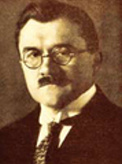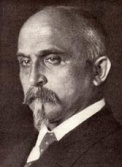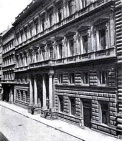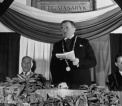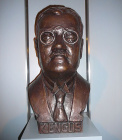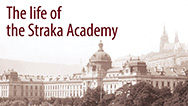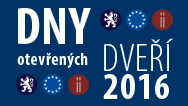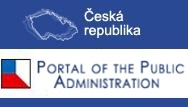Important personalities
18. 8. 2010
Karel Engliš - Politician and Economist
Karel Engliš was born in 1880 in a Silesian village Hrabyně near Opava and came from relatively poor family. At the beginning it did not look like a start of a staggering career. His parents did not expect him to study as his family was lacking financial means. However, little Karel Engliš was a very talented pupil and so, after a lot of intercessions, his parents agreed to try to pay their son, who was the ninth children, at least part of money necessary for his studies. The financial means covered four years of studying at the grammar school in Opava. Nevertheless, it was enough for Engliš to gain sufficient number of co-student interested in extra classes and such earnings covered the rest of his studies up to the school leaving examinations.
After a successful passing the examination, he continued studying at the Faculty of Law of the Charles University in Prague. Under the influence of his lecturer Albín Bráfa, who was a significant Czech politician and one of pioneers of economy science in our country, Engliš began to be specialized in the field of economy. That time, this field was at the university level developed just in the framework of the Faculty of Law.
Engliš graduated in 1904, shortly after his return from a research fellowship at the university in Munich where he was as a accompaniment of the young count Rudolf Czernin. After graduation, Engliš started to work at the Provincial Statistic Office. His engagement was a result of recommendation of his favourite lecturer Albín Bráf. Engliš proved his ability at the office in particular thanks to his enthusiasm for science; that is to say, he was able to elaborate very challenging analyses. It is no wonder that four years later František Fiedler, after he was appointed as the Minister of Trade, chose Engliš for his office.
As early as during his studies, Engliš published science papers. Part of them was also published in the magazine Čas which was edited by T.G.Masaryk. Engliš continued scientific research also during his stay in Vienna. The result of his efforts was the higher doctorate and gaining a title of senior lecturer at the Czech Technical University in Brno. During certain time he work in Vienna and simultaneously he lectured in Brno. In 1911 he left Vienna definitely and was appointed as an associated professor at Brno University. Then he began to shift his interest from the social area to the area of public finances. He published several technical books and thus, it is no wonder that he was elected a university chancellor in 1913.
Politician and Governor
The arrival to Brno also opened to Engliš gates to politics. He was invited to candidate to the Moravian Provincial Assembly where he was finally elected. He worked at this organ until the end of the Great War when his activities were restricted. The end of the war and formation of the Czechoslovak Republic brought again growth of his community involvement. Engliš was sent to Prague immediately after 28 October to work as a messenger for Moravia. Thus he suddenly stood in the very centre of the political life.
He was engaged in formation of a new right-wing political party the National Democratic Party in which various right-wing civic parties were united. He was delegated by this party to the Revolutionary National Assembly and became a member of the first Czechoslovak parliamentary body. In executing his function he drew his attention mainly to the financial issues. He went down to posterity also as a co-author of the Act on Establishing the Masaryk University in Brno, which became the second Czech university.
In the first postwar elections to the parliament, Engliš won a mandate again and continued the work as a Member of Parliament. After election, he was also appointed as the Minister of Finance. His political party was not a part of so-called red-green coalition; nevertheless, the President Masaryk wished this ministerial chair to be filled by an expert and by person preferred by the President; it was just Engliš who became such a personality. However the term of the office of this government was not very long and the cabinet had to resign after four month due to disputes in the governing Social Democratic Party.
In the new caretaker government of the Prime Minister Jan Černý, Engliš gain again the chair of the Minister of Finance. However, as a minister, he often found himself between the devil and the deep blue sea. On the one side, members of his own National Democratic Party attacked him and required tight deflation policy. Engliš rejected such approach as it was of the opinion that it would undermine the Czechoslovak economy which was in a very poor state anyway. On the other side, left-wing parties attacked him as they did not agree with cuts in the state budget, in particular in education and social affairs areas. After lots of disputes, Minister Engliš decided to resign; the first resignation was rejected by President Masaryk, but the second one was accepted.
As he remained a Member of Parliament he could continue to oppose plans of his party colleague Rašín. He was perhaps right in his opinion that too high exchange rate of the Czechoslovak crown was a main cause of the economic decline in the mid 1920'. In the end, he was so disgusted by those disputes that he left the National Democratic Party and he resigned his mandate as a Member of Parliament; nevertheless, his political activities continued on.
At the end of 1925, he was appointed again as a Minister of Finance, as he was reputable expert. He remained in his ministerial chair until 1931, with the exception of years 1928-1929. During his work he succeeded in particular in carrying out the reform of structure of the state budget, which was divided into four individual chapters. Within these chapters, expenditure and revenue were specified separately. The purpose of the reform was to make the state budget clearly arranged. Thus it was easier to control the flow of finances.
The beginning of 1930' was a period very demanding as the world was shocked by the Great Depression. Engliš involved himself in the debate on solution of the economic situation through his proposal to devalue the Czechoslovak crown. After the resignation of top representatives of the National Bank due to disputes concerning solution of the crisis, it was Karel Engliš who was appointed as the governor of the bank.
As it was mentioned above, he did not regard as appropriate to base our monetary system on the golden standard and he stood up for devaluation of the crown. On the other hand, Engliš was an objector of keynesianism and rejected the idea that the National Bank should through its activities - in particular increased emission of money, help the government in restarting the economic growth. Thus he was an advocate of the monetary neutrality. The Engliš' term of office expired in 1939 when he left the office.
Academic Activities
Since the establishment of the Masaryk University in Brno, Karel Engliš was a professor there and also its first chancellor. Very soon he became one of its most important personalities, in spite of the fact that his duties made him often leave for Prague. And thus, due to the lack of time he had to reduce his pedagogic activities in Brno.
After leaving his post at the National Bank, he also changed the place of his scientific activities as he was appointed as a professor of the Faculty of Law of the Charles University in Prague. He worked here only for a short time because Czech universities were closed by Nazis. English effaced himself and he became engaged especially in scientific work.
He continued to work on his previous concepts, in particular on his teleological economic theory. He stated in it that it was possible to understand an economic phenomena if it was possible to identify some objective or purpose in the behaviour of all its actors. In other words, not only causes and consequences influence the economic processes but it is also necessary to pay attention to the will and intention of all actors. These war activities resulted in some Engliš' books which were published after the end of the World War II.
Engliš was a very fruitful author. Among his most significant works it is possible to rank books National Economy (1924), Financial Science (1929), Teleology as a Form of the Scientific Knowledge (130), Theory of the State Economy (1932), System of the National Economy (1938). After the World War II books Economic Systems (1956) and Small Logic (1947) were published. However, it was not possible to publish the Engliš' opus magnum. The title of his work was "Great Logics" and Engliš developed his theory of knowledge in it. But the book could not be published and the typesetters were destroyed after February 1948.
After the end of the World War II, Engliš continued his work at the Faculty of Law. His scientific quality was acknowledged by awarding an honorary doctorate of the Masaryk University and also by voting in the office of the chancellor of the oldest Czech university. Unfortunately, the election was held in the time of increased political tension and his election became a political matter. As he was a significant representative of the pre-war state and economic science, he had to face a wave of attacks in particular from the side of radical communist students.
After February 1948, all those almighty officials quickly settled up with professor Engliš. He was forced to resign and to leave the Charles University. The new regime continued to take revenge on this significant pre-war scientist and politician. First of all, the regime stopped to pay out pension to him and Engliš was ordered out of Prague to the borderland and he was very fortunate not to end in a prison after a trumped up trial.
Measures concerning his deportation to a derelict gamekeeper's lodge without basic sanitary facilities in Western Bohemia were finally relaxed and Engliš was allowed to move to native Hrabyně where he died absolutely forgotten in 1961.
The heritage of Karel Engliš was rehabilitated after 1989. His books could return back to libraries. He was also decorated with the Order of T.G.Masaryk in memoriam and in native Hrabyně his statue was unveiled.
